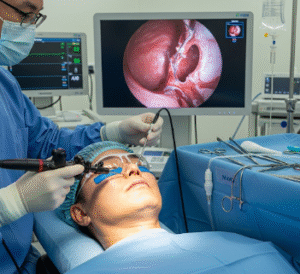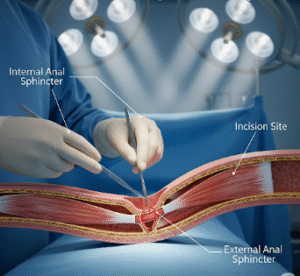Overview
Early satiety refers to the feeling of fullness after eating only a small amount of food, often before consuming a normal-sized meal. It is a symptom rather than a disease and can signal gastrointestinal disorders, metabolic issues, or systemic illnesses. Early satiety can affect nutritional intake, weight management, and overall well-being, and may be associated with nausea, bloating, or abdominal discomfort. In Korea, gastroenterology clinics provide advanced diagnostics and treatment for patients experiencing early satiety.
Highlights:
➤ Loss of appetite feeling early in a meal – Feeling full quickly
➤ Potentially serious underlying causes – May indicate digestive or systemic disorders
➤ Impacts nutrition and daily life – Can lead to weight loss and fatigue
Key Facts
➤ Prevalence: Early satiety affects a significant number of adults, particularly those with gastrointestinal disorders or chronic illnesses.
➤ Age affected: More common in middle-aged and older adults but can occur at any age.
➤ Gender: Both men and women are affected.
➤ Impact: Untreated early satiety can result in malnutrition, weight loss, decreased energy, and impaired quality of life.
What is Early Satiety?
Early satiety is defined as the inability to finish a normal portion of food due to a premature feeling of fullness. This symptom may arise from delayed gastric emptying, structural abnormalities, or metabolic disorders. It is often accompanied by nausea, bloating, or abdominal discomfort.
Highlights:
➤ Reduced stomach capacity or delayed emptying – Leads to premature fullness
➤ May coexist with nausea, bloating, or abdominal pain
➤ Indicator of underlying gastrointestinal or systemic disease
What Symptoms Are Related to Early Satiety?
➤ Fullness after small meals – Main symptom of early satiety
➤ Loss of appetite – Reduced desire to eat
➤ Bloating or abdominal distension – Gas accumulation may worsen fullness
➤ Nausea or vomiting – Especially with certain gastric or systemic conditions
➤ Unexplained weight loss – May result from inadequate food intake
➤ Fatigue or weakness – Due to reduced caloric intake
➤ Abdominal discomfort or pain – Often associated with digestive disorders
What Causes / Possible Causes
➤ Gastrointestinal disorders: Gastroparesis, peptic ulcer disease, gastritis, gastric cancer, or bowel obstruction
➤ Metabolic or systemic diseases: Diabetes, hypothyroidism, liver disease, or chronic kidney disease
➤ Medications: Drugs that slow gastric emptying or suppress appetite (e.g., opioids, certain antidepressants)
➤ Infections or inflammation: Chronic infections, pancreatitis, or inflammatory bowel disease
➤ Psychological factors: Anxiety, depression, or eating disorders
➤ Post-surgical changes: After gastric or abdominal surgery affecting stomach capacity
Highlights:
➣ Early satiety can result from mechanical obstruction, functional impairment, or systemic illness
➣ Accurate identification of the cause is essential for proper treatment
When Should I See My Doctor?
➤ Persistent early satiety – Especially if it lasts more than a few weeks
➤ Unexplained weight loss or malnutrition
➤ Abdominal pain, vomiting, or gastrointestinal bleeding
➤ Chronic fatigue or weakness – Related to inadequate nutrition
➤ History of gastrointestinal disorders or surgery
Highlights:
➣ Evaluation by a gastroenterologist in Korea is recommended for persistent or severe symptoms
➣ Early diagnosis helps prevent nutritional deficiencies and underlying complications
Care and Treatment
➤ Dietary modifications: Small, frequent meals; nutrient-dense and easily digestible foods
➤ Medical management: Medications to improve gastric emptying, treat infections, or manage underlying diseases
➤ Monitoring nutrition and hydration: Ensuring adequate caloric and fluid intake
➤ Lifestyle adjustments: Avoid heavy, fatty, or gas-producing foods; manage stress and anxiety
➤ Addressing psychological factors: Counseling or therapy for anxiety, depression, or eating disorders
➤ Symptom relief: Anti-nausea medications or acid reducers as appropriate
Highlights:
➣ Multidisciplinary approach improves nutritional intake, symptom relief, and overall quality of life
➣ Regular monitoring ensures early detection of complications or worsening symptoms
Treatment Options in Korea
Medical Treatments:
➤ Gastroenterology clinics: Advanced diagnostics including endoscopy, imaging, and gastric motility studies
➤ Pharmacological therapy: Prokinetic agents, acid suppressants, or medications for underlying systemic disease
➤ Nutritional support: Dietitian-guided meal planning for adequate nutrition
Advanced Procedures:
➤ Endoscopic evaluation: To identify structural or obstructive causes
➤ Surgical interventions: For tumors, strictures, or severe anatomical abnormalities
➤ Gastric electrical stimulation or motility therapies: For severe gastroparesis or delayed gastric emptying
Rehabilitation & Follow-Up Care:
➤ Ongoing monitoring of weight, nutrition, and gastrointestinal function
➤ Integration of dietary counseling, pharmacological management, and psychological support
➤ Holistic care in Korea includes multidisciplinary collaboration among gastroenterologists, dietitians, and rehabilitation specialists
Highlights:
➣ Korean clinics offer comprehensive, technology-assisted care for early satiety
➣ Early intervention improves nutrition, symptom control, and quality of life













